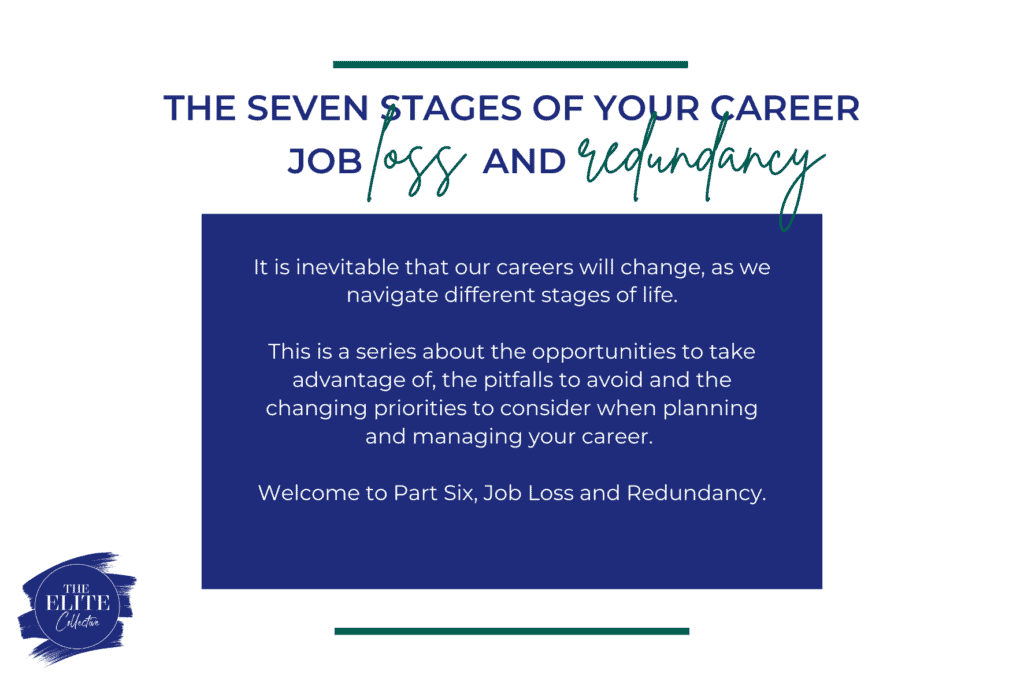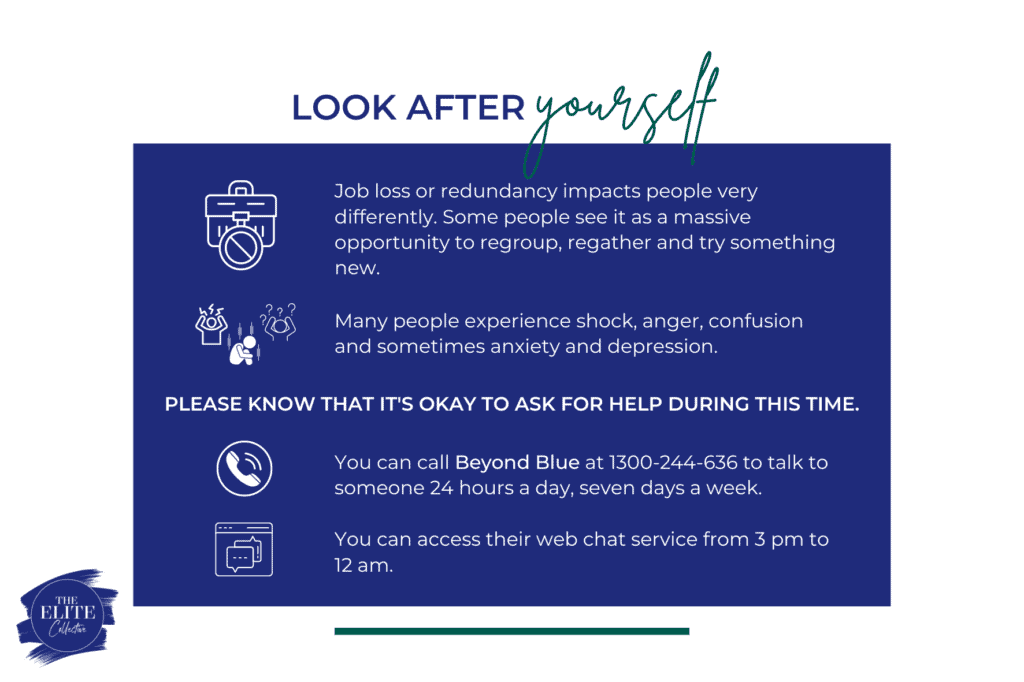 Adriana Modersitzki
Adriana Modersitzki

If you’re here, it’s very likely that you or someone close to you is navigating the shock of sudden or unexpected job loss associated with either redundancy, unexpected termination based on performance or conduct, or perhaps business closure.
You may be wondering what to do next.
The first thing I’d like to suggest is that you take a big breath. It’s happened. You are more than your job, and you have support available. Let’s make a list of what you need to do, to ensure you are looked after.
Let’s check in on the first few things you can do right away, before we pivot to how you can get set up for new opportunities to come knocking on the job front.
i) Spend some time reviewing your budget, and assess what you have coming to you, either in a redundancy payment, annual leave or long-service payouts.
ii) MoneySmart have a great budgeting resource that could be very helpful, if you’re starting from scratch here.
iii) Consider contacting your bank or services provider if you are having significant trouble paying your coming bills, such as utilities, mortgage or loans. It may give you a little breathing room to regroup!
i) You can find out if you are eligible for government assistance by reaching out to Services Australia.
ii) Don’t forget to take a good look at your superannuation and any relevant insurances you may have. Some policies have built-in income protection policies that will provide short term financial support, or allow early access to superannuation in times of financial hardship.

Once you have squared away some of the immediate stress and pressure, let’s identify your next steps.
It may not feel like it at this moment, but this can be an opportunity to re-evaluate your path, make a career change, and find greater job satisfaction or fulfilment. If this is your focus, we can support you with these conversations here at Elite with our Career Clarity sessions.
If you need to immediately find another job, I urge you to stack the deck in your favour by having as many things as possible ‘working in the background’ at once.
What does that mean? Well, rather than working with one job services provider for two weeks, and then giving up and applying on your own for two weeks, and THEN going and seeing a recruitment agency about temporary work after another two weeks – fire them all up at once!
I suggest:
It’s time to update your resume with your most recent and relevant information. Don’t sell yourself short with a resume that doesn’t reflect how genuinely unique you are – it’s your first opportunity to make a lasting impression on a potential employer. You want to make sure it’s a good one!
Your resume should showcase your relevant skills and experience and demonstrate to a potential employer what value you will add to their business. That means you write your resume and application with an eye to what THEY want. Not what you want from them.
Not sure where to start? We’ve got your back – check out our blog here to assess whether your resume is ready. We can support you with your resume development, or you can access a more cost-effective option that can grow with you and your career, by enrolling in our Resume Writing Course.
Don’t apply willy nilly. I have said three here, because I want you to have time to tailor your application to each role, and really make strong, intentional choices.
We have all heard the stories about people sending out hundreds of applications per day.
I can promise you that three, well written, personalised applications per day will work harder for you than 100 applications to random roles that you aren’t aligned with.
Your network can’t help you if they don’t know what you’re facing. So let them know you’re back on the market and looking!
Go beyond just updating your LinkedIn status to ‘Open to opportunities’. Reach out to family friends and social networks, place phone calls to recruitment agencies you have worked with in the past, ask for introductions.
Keep it friendly, positive and confident, and be ready to share the value that you have to offer.
Pssst….If you’re making phone calls, jotting down a couple of dot points on paper can help you stay on track and ensure you’re communicating your key points!
Engage with private recruitment agencies, and consider temporary or contract assignments as well as permanent assignments.
If you are eligible to work with a job services provider or an organisation such as SoldierOn or RSL Veterans Employment – get them in your corner!
There are two main players you need to get on board for these conversations to go well – yourself and whoever you’re talking with.
Yes. Yourself. The way you manage your inner self-talk in relation to your redundancy or job loss is crucial. It’s natural to feel a twinge of embarrassment or to see your confidence drop a little during this time, because these days, our personal identities are often so closely entwined with our careers.
Folks, we need to put it to bed.
Spend some time with a pen and paper, and go through these questions to remind yourself of what you can bring to the table.
These notes will transfer beautifully to support conversations with future employers where you address your redundancy or job loss. (They also go SUPER well on your resume or cover letter 
We’ve all lived through COVID and its impacts on employment. It’s not as uncommon or stigmatised as it has been in the past.
When talking to an employer or person within your network about your job loss or redundancy, please remember that you don’t have to share every last detail.
We want the ‘CliffsNotes’ version of how and why you left, with a strong focus on honesty and positivity.
Select your language carefully and avoid words such as ‘fired’, ‘sacked’ or ‘terminated’, as well as avoiding any negative commentary on the manager, workplace culture or expectations of you.
“I wanted to make sure we’re both on the same page. I’m sure you’ve noted the gap in my employment from June 2020 through December 2020. COVID impacted my industry quite significantly, and our Australian offices underwent a restructuring that saw 30% of the in-office positions stood down. While I was genuinely disappointed, I was able to take this time to support my children’s home learning and to do some study of my own that would transfer really well to this new position.”
With that out of the way, you can then focus on why this particular role and company aligns with your key strengths and attributes.
Your first stop should be the Fair Work Commission. They assist with issues pertaining to bullying, discrimination, redundancy and can discuss any concerns you have around unfair or unlawful dismissal
In summary, job loss and redundancy will always have some element of stress and upset. however, they can also be excellent opportunities to explore new roles and companies, consider a career change, or undertake training or education.
Ideally, you will be clicking away from this blog article with a couple of action items that will help you, and perhaps a different perspective.
This blog is the sixth in a series about navigating the opportunities, potential pitfalls, and changing priorities of planning and managing your career.
If you or someone you know are looking for a job for the first time, check out Part One here.
Or, if you are no longer a graduate and would benefit from a few tips and tricks to build a meaningful and successful career, you can read Part Two here.
Maybe you’re wondering how to build a successful career in your chosen profession – find out how in Part Three here.
Or, perhaps you’re looking to return to work after taking parental leave – if so, Part Four here has got you covered.
Part Five saw us dive into navigating career change on your own terms, and you can read it here.
Our team of professional resume writers are located across Australia, specifically in Canberra, Melbourne and Sydney. We have clients throughout Australia who rave about our professional resume writing services, job application support and interview coaching. Get in touch with us today, and make your next career move with the support of a team of professionals.
We respectfully acknowledge the traditional custodians of the land upon which we live and work, the Ngunnawal people.
We acknowledge and respect their continuing culture and the contribution they make to the life of this city and this region, and extend that same respect to all Aboriginal and Torres Strait Islander people.